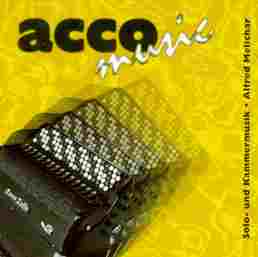Solo and Chambermusic

Alfred Melichar, Accordion
Alfred Hertel, Oboe
Michael Mitterlehner, Vibraphone & Glockenspiel
Thomas Pozlberger: Viola
Peter Rohrsdorfer: Alto Saxophone
Anton Schachenhofer: Contrabass
Acco Music
Solo and Chambermusic
Alfred Melichar, Accordion
Alfred Hertel, Oboe
Michael Mitterlehner, Vibraphone & Glockenspiel
Thomas Pozlberger: Viola
Peter Rohrsdorfer: Alto Saxophone
Anton Schachenhofer: Contrabass
Program:
Erich Urbanner: Duo for Accordion & Contrabass
Ernst Krenek: Acco-Music for Accordion
Erland Maria Freudenthaler: Fruehlings-Erwachen for Viola, Accordion and Vibraphone
Tera de Marez Oyens: Ananse duo for Oboe and Accordion
Balduin Sulzer: Kleine Serenade for Viola, Accordion & Glockenspiel
Gerg Aranyi-Aschner: Sonata for Accordion
Aranyi-Aschner: Kleine Fantasie for Accordion
Ferdinand Weiss: Saxo-Accordiofonia for Alto-Saxophone and Accordion
Astor Piazzolla: Contrabajeando for Accordion
Joaquin Rodrigo: Moto perpetuo for Accordion
Total Time: 69:37
label: Extraplatte Musikproductions und Verlags GmbH (EX 252 095-2)
PO Box 2
A-1094 Vienna
Austria
Phone: +43/1/310 10 84
FAX: +43/1/310 03 24
email: extraplatte@blackbox.at
Review by Henry Doktorski:
Although the accordion was invented in Austria in 1829, during all those years Austria never played a significant role in accordion history (at least according to Dr. Georg Schulz) until 1984, when the free-bass accordion was finally accepted as a major i nstrument in the curricula of an Austrian Academy.Since then, Austria has quickly made up for lost time, as can be determined from this wonderful album (of nearly seventy minutes in length!) consisting mostly of superb performances of Austrian chamber music for accordion. Although the pieces are decided contemporary, most of the music is surprisingly easy to listen to; even tonal at times.
Sulzer's "Kleine Serenade" for viola, accordion and glockenspiel is enchanting with its delightful sonorities and interplay between the three instruments. The beginning of the piece evokes a romatic mood, but later on it becomes alive with musical ghosts -- like in Shakespeare's night scenes. However, the ghosts do not stay very long and after some time everything becomes quiet again.
Freudenthaler's "Fruehlings-Erwachen" for viola, accordion and vibraphone begins with a mysterious-sounding diatonic wash on the vibraphone, which is soon punctuated by gasps of air from the accordion and long glissandi from the viola. I found the piece, described in the CD booklet as a depiction of the awakening of Spring, to be fascinating.
Other pieces stand out in my mind, such as the Hungarian-born Georg Aranya-Aschner's "Sonata" in four movements, Urbanner's "Duo" for accordion and contrabass and Krenek's "Acco-Music" for solo accordion.
One of the most interesting pieces in my mind was "Ananse Duo" for oboe and accordion. The title refers to the trickster god of the Ashanti people and the piece is exudes irreverent vitality and creativity.
The album ends with two pieces originally written for bandoneon: "Contrabajeando" by Piazzolla and "Moto Perpetuo" by the Spanish composer Joaquin Rodrigo. In my opinion the former is the weakest track on the album. Melchar's performance of the tango is simply not dramatic enough for my taste; it is very difficult to follow in Piazzolla's footsteps.
Alfred Melichar, studied at the prestigious Chopin Academy in Warsaw with professor Lech Puchnowski and since 1980 has taught at the Bruckner Conservatory in Linz. The CD booklet notes are printed in German and English. Contemporary classical accordion lovers will enjoy "Acco Music" by Alfred Melichar.
| About The Free-Reed Review |
| Invitation to Contributors / Submission Guidelines |
| Back to The Free-Reed Review Contents
Page |
| Back
to The Classical Free-Reed, Inc. Home Page |